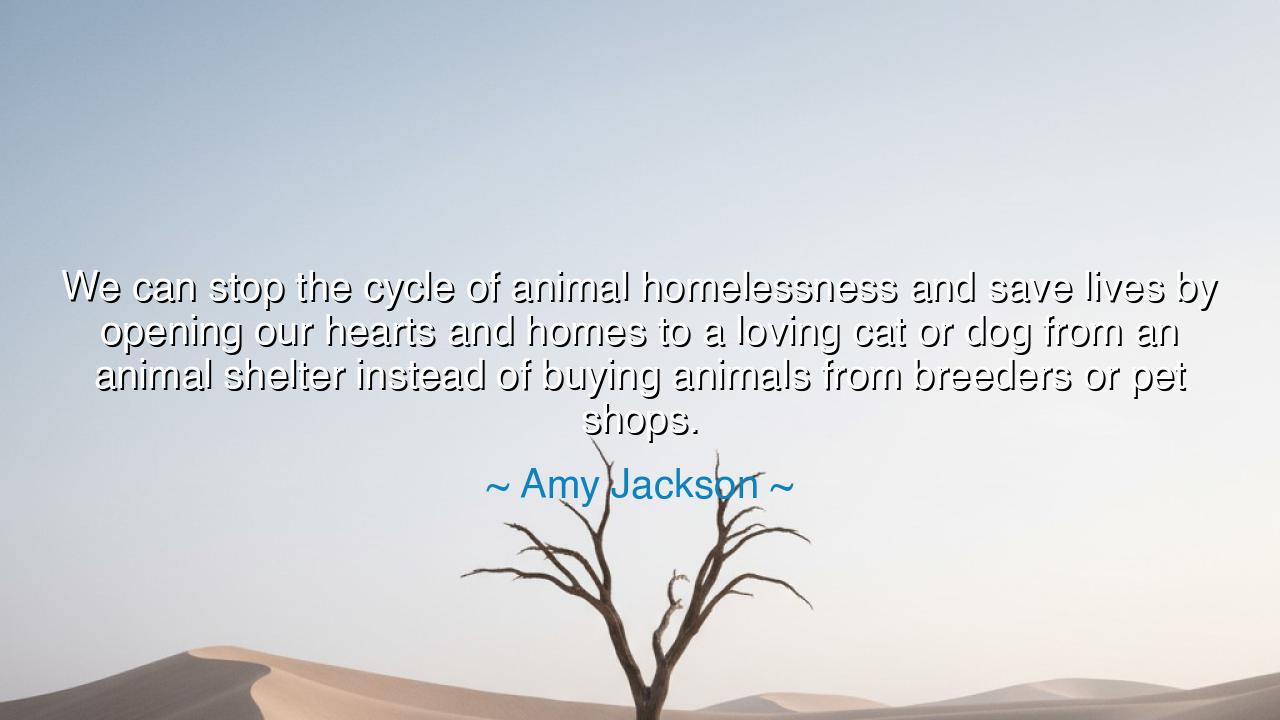
We can stop the cycle of animal homelessness and save lives by
We can stop the cycle of animal homelessness and save lives by opening our hearts and homes to a loving cat or dog from an animal shelter instead of buying animals from breeders or pet shops.






In the words of Amy Jackson, the ancient teaching resounds: “We can stop the cycle of animal homelessness and save lives by opening our hearts and homes to a loving cat or dog from an animal shelter instead of buying animals from breeders or pet shops.” These words carry not only compassion but also a warning, a call to rise above indifference. They speak of a great cycle, one of suffering and abandonment, of life cast aside as though it were a possession rather than a sacred breath of spirit. The ancients would remind us that the mark of a civilization is not only in its temples or its laws, but in the mercy it shows to the most vulnerable under its care.
The cycle of animal homelessness is like a wheel that grinds ceaselessly. Dogs and cats, born into litters unplanned, wander streets hungry, unloved, their cries unheard by most. Meanwhile, gold and silver exchange hands in pet shops and breeders’ stalls, as if companionship could be bought like cloth or stone. Jackson’s words pierce this illusion, for she proclaims that life cannot be purchased; it must be honored, cherished, and rescued when it is most in peril. The wisdom here is not simply about animals—it is about the human soul, and how we measure ourselves against the quiet suffering around us.
There is an old tale from Greece, in which a philosopher once saved a beaten horse from a cruel master, taking it into his household despite the whispers of others. When questioned, he said, “It is not the horse that I save, but my own humanity.” So too, when we adopt a shelter animal, we do not merely save that fragile life—we rescue something within ourselves, something noble, something that remembers the bond between all living beings. It is a heroic act disguised in the quiet opening of a door, in the gentle offering of food and safety.
And let us recall a more recent story, from the troubled streets of New Orleans after Hurricane Katrina. Amidst the floodwaters, thousands of pets were left behind, their families scattered by disaster. Shelters overflowed with frightened, abandoned animals. Yet there were those who came, ordinary people, who opened their hearts and homes, adopting these survivors. For many, the healing flowed both ways: the rescued found safety, and the rescuers found renewed hope and purpose after tragedy. Such is the mystery of mercy—that in giving, we too are restored.
To choose adoption over purchase is not merely a practical act but a moral stance. It declares that love is not a commodity, and that one life saved outweighs the fleeting desire for pedigree or appearance. In every shelter lies a multitude of stories—eyes that have seen abandonment, paws that tremble at kindness, hearts still willing to trust despite betrayal. To welcome such a being into our home is to embrace resilience and forgiveness incarnate. What greater teacher could one ask for?
This teaching also strikes at pride and vanity. Many seek animals as ornaments, chosen for their rarity or their bloodline, as kings once displayed lions in gilded cages. But the wisdom of Jackson’s words urges us to look deeper. It is not lineage that ennobles, but love. The humble shelter dog who waits behind bars carries within it the same infinite spark as the most prized champion breed. By choosing the overlooked, we honor what is eternal, not what is fleeting.
The lesson for future generations is thus: compassion is a power that changes the world, one life at a time. To the young, I say—when you are ready to welcome a companion, turn first to the shelters. Walk among them, hear their silent cries, and feel which soul calls to yours. In that moment, know that you are not buying, but saving; not acquiring, but restoring balance to the broken cycle.
So let the teaching echo: Open your heart, open your home. Adopt, do not buy. Choose mercy over vanity, life over commerce. In doing so, you will save not only the lives of countless cats and dogs, but also uplift the dignity of humankind. For every act of rescue is a stone laid upon the foundation of a more compassionate world—and such a world is worthy of those who come after us.






AAdministratorAdministrator
Welcome, honored guests. Please leave a comment, we will respond soon